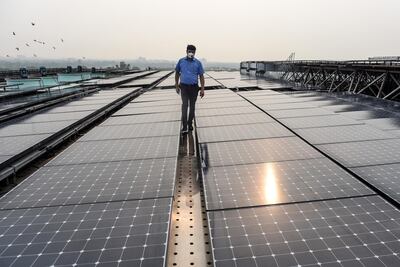Covid-19 has demanded government action and intervention on a scale that we have never seen before. World leaders and intra-governmental agencies have directed mass shutdowns of industrial activity to steer the public towards safety. As a result greenhouse gas emissions have been slashed.
In many cases, however, this environmental reprieve has come at the expense of economic growth and stability. This has reignited a business case for sustainable development across the board – and not a moment too soon.
The forecast for 2020 is an 8 per cent reduction in global energy consumption, the lowest since the end of the Second World War, according to the International Energy Agency.
Consequently, carbon emissions could undergo a 3 to 13 per cent reduction compared to 2019, depending on when full lockdown measures are lifted across the globe, according to the Global Carbon Project, a group of international scientists.
While it is true that environment has been somewhat let off over the first half of 2020 due to the pandemic, a harder reality has taken root. Even if energy consumption remains on track for these record lows through the rest of the year, it will not make much of a difference to the extent of global warming our planet is likely to experience by 2050.

We face the frightening fact that 92 per cent of the decarbonisation process still remains if we are to even come close to meeting the goal of the Paris Agreement, which was to keep the global temperature rise during this century well below 2°C and in fact to limit the increase to 1.5°C – as was the case before the Industrial Revolution.
To this end, we have been given a head start, nothing more. It should immediately dawn on anyone committed to protecting the planet that we cannot achieve our global energy transition and climate action goals in a piecemeal fashion.
It is not going to be enough to regulate and make cuts industry by industry, as we have seen during the pandemic, as this has only led to a fraction of the reduction needed.
The World Economic Forum recently announced their 2021 theme: “The Great Reset”. This gives us a push to build new foundations of our economic and social system for a more fair, sustainable and resilient future, with green and renewable energy practices at ground zero. But this cannot be led by governmental players alone. It requires every member, group and organisation of society. We must migrate towards a more sustainable economic ecosystem powered by all stakeholders, both private and public.
As businesses and enterprises join forces to help the global economy off its knees, it is time to push for the creation of climate-friendly infrastructure. The benefit of such an infrastructure would be manifold: it would preserve our natural resources, achieve a balanced energy mix – to boost economies – and would ultimately create jobs. It is crucial that businesses now diversify away from traditional ventures and invest in the sector of renewables. There is a good reason for this.
Renewables fared relatively well during the pandemic, despite some disruption to global supply chains. When the pandemic took hold, energy operators needed to meet reduced demand with the most cost effective sources of energy to keep control over their cashflow.
As it happens, the cheapest sources of energy are the cleanest: renewables. Indeed, as per a report last month by the International Renewable Energy Agency (Irena) Renewable Power Generation Costs in 2019, renewables have become the cheapest source of energy, with the cost of solar energy falling by 82 per cent over the past 10 years.
And with conversion efficiencies of solar, wind and thermal farms improving all the time – and given the industry’s propensity towards innovation – renewables, over time, are going to only grow better at supplying the major grids with the energy they need.
It is also telling that in fewer than 10 weeks, during the peak of the pandemic, the US, Germany, Italy and Spain significantly increased their renewable energy consumption – by up to 40 per cent in some instances. India’s renewables usage shot by 45 per cent. In the UK, renewables accounted for nearly 30 per cent of power generation between March and May, according to data from Drax Electric Insights.
And in the UAE, which is already aggressively pursuing major solar capabilities, there has been a notable increase in the number of waste-to-energy projects that are commissioned and constructed. These not only help with zero-waste ambitions but further diversify the nation’s cleaner energy sources.

By all measures, this is a global trend and there is no reason why it should not continue. Especially when we consider that renewable energy capacities have grown steadily and impressively for almost the past two decades, to the point where it is now preferred by investors. In April Irena’s annual Renewable Capacity Statistics report stated that 72 per cent of all new power capacity comes from a renewables plant.
Consider the possibilities that lie before traditional markets that have been affected by the pandemic, such as real estate, manufacturing and hospitality, among others.
Given the global need for more affordable housing, there is the potential for real estate developers to integrate renewable technologies into new constructions to power homes – including integrated photovoltaic (PV) panels on rooftops, which could add more energy into the mix at a higher yield than yet more income from rent or sales.
Transportation hubs could build on-site renewables plants to lower energy costs, such as we have seen at Dubai International Airport. Manufacturing units can integrate PV panels into their infrastructure to power their operations, as we have seen in Nestle Middle East's Al Maha factory in Dubai.
Educational institutions too could build on-site renewables plots that could power their buildings. They could then be used as practical examples to educate students and prepare them to join the future workforce.
To reach this point, we need a convergence of the triumvirate: government incentives, private sector investments and the public sector’s future planning.
The business case for increasing the presence of renewables in our economies is not new. But the pandemic has accelerated this into an even more compelling case and it can no longer be ignored. It is time we turned talk and possibilities into realities.
Dr Nawal Al-Hosany is a permanent representative of the UAE to the International Renewable Energy Agency




